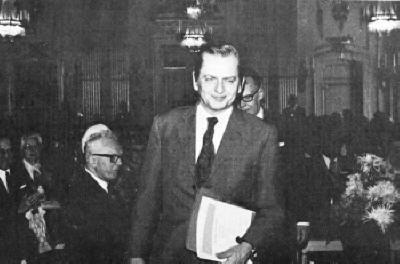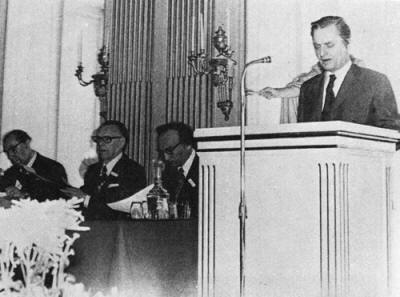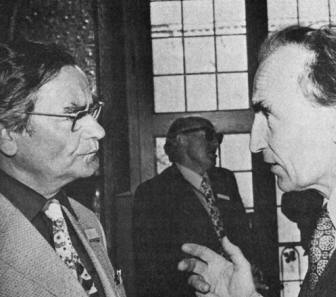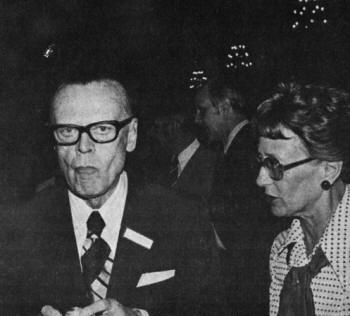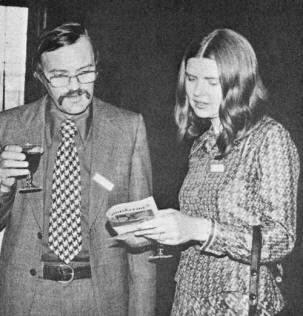„Es nebrīnītos, ja zinātnieki kādu dienu secinātu, ka pamatu pamats tam, ka Baltijas tautas nav pagaisušas vēstures vēju brāzmās, bet saglabājušas savu seju ir stiprinājumā, ko tās caur savām organizācijām guvušas no sava kultūras mantojuma, dziesmām un tradīcijām, dzejas mākslas, mūzikas un zinātnes,” teica Zviedrijas ministru prezidents Ulofs Palme (Olof Palme), atklājot Baltijas institūta 3 zinātnieku konferenci Stokholmā 1975 gada 13. jūnijā. − Ulofs Palme ierodas atklāšanas aktā Zviedru akadēmijas svētku zālē.
Gunara Irbes uzņēmums
TREŠĀ INTERNACIONĀLO ZINĀTNIEKU KONFERENCE
UN ULOFA PALMES RUNA
Stokholmā Baltijas institūts bija no 13-16. jūnijam sasaucis 3. internacionālo zinātnieku konferenci, kuŗā turpat 80 zinātnieki no 15 zemēm referēja par pētījumiem, kas veikti valodniecības, literātūrzinātnes, tautsaimniecības, vēstures un sabiedrisko zinātņu jomā, risinot kādu ar Baltijas valstu territoriju vai igauņu latviešu un lietuviešu kultūru saistītu problēmu.
Baltijas institūts, šo konferenci sasaucot varēja atskatīties arī uz pieciem darbības gadiem, kuŗos ne tikai izkārtotas trīs zinātnieku tikšanās un speciālsimpozijs studējošai jaunatnei, bet aizsākti arī vairāki zinātniski projekti, galvenokārt valodniecības laukā.
Konferenci 13. jūnijā Zviedru akadēmijas (Svenska Akademin) telpās atklāja Zviedrijas ministru prezidents Ulofs Palme (Ulof Palme).
Ulofa Palmes nostāja mazo tautu pašnoteikšanās jautājumā ir vispār zināma. Nav arī noslēpums, ka ministru prezidenta dažas bērnības vasaras saistās ar Latvijas laukiem Valmieras un Cēsu apkaimē, uz ko Palme norādīja arī runai sekojošā neformālā piebildē. Konferenci atklājot, Palme runāja angliski, un lai dokumentētu viņa teikto un negrozītā veidā darītu zināmu arī mūsu lasītajiem, publicējam to šeit oriģinālversijā.
Konferenci atklājot Ulofs Palme teica:
„It is a great pleasure for me to welcome so many delegates to the Third Baltic Scientific Conference in Sweden. This year more delegates than ever before will be reporting on contemporary research in Baltic matters. I see that half of the delegates do not come from the Baltic countries and that some have travelled here from such far-away places as Australia and Japan. This shows that there is a dynamic interest in the history and culture of the Baltic peoples also among research scientists that have no roots m Estonia, Latvia or Lithuania. It is almost exactly five years ago the Baltic Institute in Scandinavia, which arranges these conferences, was established here in Stockholm − five short years of conscientious labour and constant endeavour to promote Baltic research in Sweden.
As I see it, the Baltic Institute has two prime tasks: First, to help stimulate and develop the cultural life of the Baltic minorities in Sweden. It is essential that their language and their cultural identity be preserved, not only for the Baltic immigrants’ own sakes but also as a source of enrichment for Swedish cultural life.
People of Baltic origin have already made important contributions to Swedish scientific research and Swedish cultural life. I am convinced that they will do so in the future too.
The second task is to extend intercommunication with the scientific and cultural institutions in the Baltic homelands. The rationale of this is historical tradition, geographical proximity and cultural background. Cultural exchange is the growth medium for versatility, tolerance and understanding between peoples, irrespective of economic and religious conditions. It is in this light I regard the economic support given by Sweden to the Baltic Institute and the Baltic Archives.
Thirty or forty years ago tens of thousands of Baltic people fled the war and came to Sweden. It was the first time in Swedish history that a large group of people immigrated to our country within a short space of time. They came then to a nation that was in deep sympathy with their problems. But in retrospect, we realize that the country they came to was greatly lacking in both experience and the means to help immigrants to make a new start in a new country. I know that many Baltic people suffered because of this deficiency. They had to grapple with greater adjustment problems than would have been necessary had we known what we know today. In spite of this, I think we can agree on the whole that those who stayed in Sweden have settled down well and proved their capacity to develop their intrinsic qualities and talents.
In a way it was the Baltic immigrants that had to teach the Swedes that it was necessary to have an immigrant policy. It was also very much thanks to the strong sense of community and good organization of the Baltic immigrants that we realized the need of a minorities policy. We gained from this experience when in the years 1944-1970 we opened our borders to 600,000 immigrants. There are now about 400,000 foreign citizens living in Sweden. In addition to this number, 240,000 have become Swedish nationals. Sweden is now an immigrant country. Therefore we must pursue a policy that meets the demands immigrants very rightly make of us.
Consequently, when the great streams of migrants from the Nordic countries and southern Europe arrived during the sixties, the ground was prepared for a more active immigrant policy in Sweden. Programmes and resources have been enlarged step by step. But by no means would I assert that we have reached any final goal. In the future, too, we must be prepared to take new steps when new problems arise.
Sweden has aspired to shape an integrated immigrant and minorities policy that will promote equality between immigrants and the rest of the population. We want to establish co-operation between Swedes and immigrants and strengthen their mutual solidarity. If this is to be accomplished it is absolutely vital that the immigrants and the linguistic minorities be given better facilities for preserving their own languages and their cultural heritage. The proposals for a new immigrant policy passed by the Riksdag during its Spring Session have three goals in view: equality, freedom of choice and co-operation.
The equality goal implies a call for continued efforts to ensure that immigrants will have the same opportunities, rights and obligations as the rest of the population. Equality will also be the guiding principle in the cultural and language field. This means that immigrants must be enabled to retain and develop their native languages and carry on cultural activities. The equality goal demands respect for the linguistic and cultural identity of immigrants.
The freedom-of-choice goal means that immigrants will be allowed to choose to what degree they wish to integrate into Swedish culture and to what degree retain and develop their native culture and language.
The co-operation goal implies mutual co-operation between the immigrant and minority groups on the one hand and the majority population on the other. It demands mutual tolerance and solidarity between immigrants and the rest of the Swedish population. The Bill stated that the co-operation goal can only be realized if immigrants are given greater opportunities of taking an active part in political life in Sweden and of running their own cultural activities.
The new immigrant policy we are now initiating does not mean, of course, that we shall reach these goals at once. It will take a long time and cost money. But we are determined to proceed step by step along the lines we have staked out. May I say on behalf of the Government that it is with these goals in view we deal with everyday immigrant problems. We have established a basic principle governing our actions. Now our efforts will be concentrated on attaining these goals.
I should particularly like to stress three of the measures that will be taken as a result of the bill passed by the Spring Riksdag: An improved and strengthened organization. This means, for instance, increased resources to the National Immigration and Naturalization Board; an Immigration Council to be set up at the Ministry of Labour; and an expert group on immigration research to be convened in order to stimulate increased research into issues affecting immigrants.
In order to attain the equality, freedom-of-choice and co-operation goals, immigrants must be given greater opportunities to take part in political life and the national debate. Therefore, the Government will propose to the Autumn Riksdag that immigrants shall be given the right to vote in and be eligible for elections to local, county and church, councils, even if they are not Swedish citizens. According to the committee report now being considered by the Government, this is to apply to immigrants who have been resident and registered in Sweden for three years. The new voting rights will be available for the first time at the 1976 election.
There is a deeply rooted tradition in Sweden that the best way to get things done is to join forces in an organization or society. The popular movements are a powerful driving force in the evolution of society. I refer to political associations, labour organizations, consumer and housing co-operatives, religious and temperance movements and many others.
As the Government strives to establish an active immigrant policy we base our hopes very much on the immigrants’ and the minorities’ own organizations. Today they have 75,000 members. If in the future too, they show the same readiness to organize themselves in associations, we regard this as an extension and deepening of old Swedish traditions. We are prepared to implement much of immigrant policy through the immigrants’ and the minorities’ own organizations. They should, then. also be given specific economic assistance. As a first step, a total of 1,6 million Swedish crowns (some 400,000 US dollars) will be allocated in the next fiscal year to the democratically constituted national organizations of the immigrants and the minorities. In addition, the state will be granting subsidies to all organizations and local authorities arranging special projects for immigrants.
I have intentionally stressed the role played by organizations in an effective immigration and minorities policy because, this being a democratic society, the success of our policy will hinge upon individuals becoming involved in, and having confidence in organized co-operation. I believe that the Baltic groups in Sweden are particularly well equipped to take advantage of the opportunities offered by the new immigration policy via their organizations. As in Sweden, Baltic cultural life is interwoven in a fabric of organizations. There we see adult education organizations, national and regional societies, choral and theatrical societies.
It would not surprise me if one day research found that the basic reason why the Baltic peoples have been able to keep together during the squalls of history and to preserve their identity is the strength they have drawn through their organizations from their cultural heritage, their songs and traditions, their poetry, art, music and science. It is through organizations and culture that small peoples assert their individuality.
Sweden is a small country with a very small cultural and language sphere. The Baltic groups living in Sweden are, in their turn, only a small part of the Swedish community. But we have interests in common in the Swedish community.
If we can give one another mutual support − with Sweden helping to uphold Baltic culture and the Baltic minorities transmitting impulses from their native countries and other countries to which they have immigrated − I believe that together we can promote cultural and scientific development to the benefit of both parties.
I hereby declare the Third Baltic Scientific Conference open. I trust the Conference will be a great success and that the discussions and debates held here will be very worthwhile to all its participants.
(JG)
